Iran's Supreme Court Confirms Death Sentence For Protester
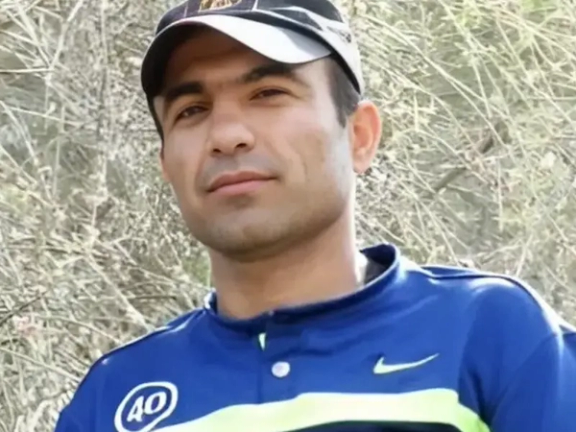
The Supreme Court of Iran has officially confirmed the death sentence for Mojahed Kourkour, a protester detained during the Women, Life, Freedom protests.

The Supreme Court of Iran has officially confirmed the death sentence for Mojahed Kourkour, a protester detained during the Women, Life, Freedom protests.
Mojahed (Abbas) Kourkour was taken into custody on December 20, 2022, following violent clashes between protesters and security forces near Izeh. Earlier this year, the judiciary issued a death sentence for Kourkour, designating him as the "main suspect" in the case involving the killing of 10-year-old Kian Pirfalak.
Pirfalak's family have explicitly blamed government forces for their son's death. On the evening of November 16 last year, the family's car, carrying Kian, his parents, and three-year-old brother Radin, was targeted by plainclothes individuals in Izeh. Kian’s father sustained severe injuries and was paralyzed during the shooting. Authorities claim the family car was attacked by "terrorists".
Contrary to official statements, Zeynab Molaei-Rad, Kian's mother, asserted that their car was shot by security forces and released a photo of herself with her hands in the hands of Kourkour's mother. Maysam Pirfalak, Kian's father, who was severely injured during the incident, also released a video rejecting the allegations against Kourkour following the judiciary's announcement.
Negar Kourkour, Mojahed's sister, said her brother's case had been transferred from the first branch of the revolutionary court in Ahvaz to a court in Izeh, southwest of Iran.
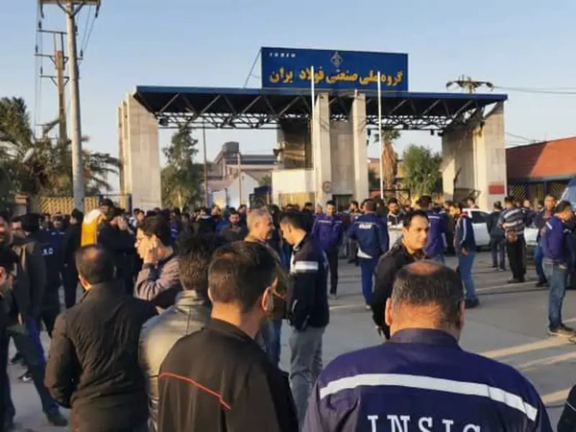
The employees of Iran's National Steel Industrial Group in Ahvaz continued their strike for a second day after 21 employees were banned from working.
Chanting slogans such as "Neither threats nor prisons are effective anymore", it was prompted by recent work bans as punishment for participation in protests and the failure to implement job classification plans, according to Ilna news agency.
Following the Saturday strike, the management blocked the entry cards of 17 other workers and on Sunday, there was a heavy security presence at the strike site, according to the Free Union of Iranian Workers Telegram channel.
Ilna quoted Ali Mohammadi, the CEO of the group, as saying the workers' ban was to “prevent the gatherings and halts in production lines from happening," indirectly threatening workers' salaries would not be paid if the protests continued.
"We have to pay the salaries of 3,000 personnel on the seventh or eighth day of this month, and the salaries cannot be paid with closed production lines," Mohammadi said.
In August, the Minister of Labor had stated that workers should negotiate salary increases with their employers directly, and denied that this had any relation to his ministry.
After failing to negotiate for the implementation of labor laws, many workers, including Ahvaz Steel, have also had problems with salary increases, leading not only to security clashes but also to threats of salary cuts in response to their protests.
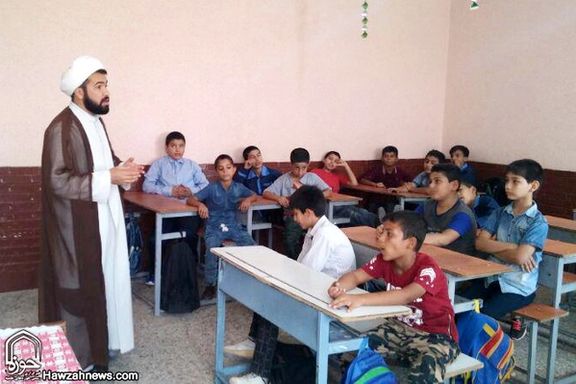
The ministry of education in Iran has announced the appointment of 3,000 male and female seminary students as teachers amidst a purge of the country's schools.
The move aligns with the ministry's broader initiative, known as the "Mosque, School, and Home" program, which includes plans to establish seminary-affiliated schools.
The development coincides with an ongoing transformation in the education system, marked by a significant "purge." Reports from September indicated the replacement of over 20,000 principals as part of the "transformation plan," implemented in the aftermath of anti-government demonstrations in 2022.
Education Minister Reza Morad Sahraei has refuted allegations of purging administrators, stating that some are retiring while others are being replaced by new individuals.
Ministers in President Ebrahim Raisi's administration have underscored the "revolutionary" nature of the education ministry. The collaboration between Iran's seminaries and the ministry of education extends to the "Amin" plan, initially focused on Qom but now encompassing other cities. Under this plan, 21,000 seminary graduates have been recruited to teach in 7,000 schools across the country.

Iran's Police closed down one of the country’s leading bookstores in Tehran on Friday for allowing women without “proper” Hijab to participate in a cultural event.
In a statement posted on its website, Shahr-e Ketab (Book City), a flagship chain bookstore, revealed that the police department in charge of overseeing retail shops, restaurants and similar businesses had sealed its central store in Tehran.
The police cited a “failure to abide by regulations of trade and interior ministry’s [directives]” as the reason for the closure of the popular bookstore in the heart of the capital.
Shahr-e Ketab, Iran’s largest chain of book and music stores, is a non-profit organization that operates dozens of modern bookstore-cafes across the country. In addition to selling books, it holds various cultural events.
“The Book City of Tehran was closed down over a few strands of hair!” Mohammad-Taghi Fazel-Meybodi, a prominent cleric who opposes coercion of women to wear the hijab, said in a tweet Friday. He questioned the religious and legal justification for suspending cultural centers and businesses over such minor issues and criticized the authorities for disgracing the country.
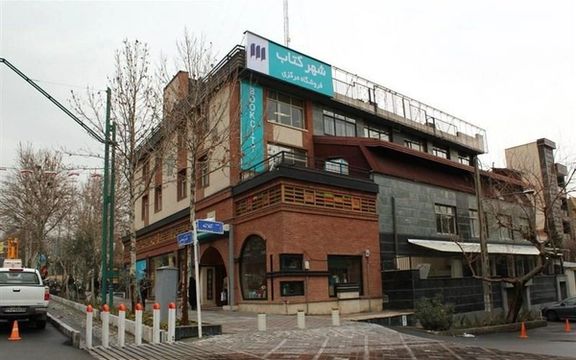
Fazel-Meybodi, like many others, also criticized the government for prioritizing the enforcement of hijab rules over addressing more pressing issues such as corruption and economic improvement. He suggested that the money spent on enforcing the compulsory hijab could have been better utilized to combat embezzlement and rising prices.
In recent months, authorities have increased pressure on businesses and retailers to enforce hijab rules and have warned or shut down thousands of businesses.
The closure of businesses for hijab-related issues, a tool used by authorities for four decades, is aimed at pressuring them to police women's hijab compliance, allowing the police and other authorities to avoid direct confrontation and potential clashes with citizens over hijab observance.
Many among Iranian women are increasingly refusing to wear the hijab even at the risk of being deprived from services in government offices, hospitals, and other public areas or their vehicles being impounded by the police for weeks.
On Friday an airport police official, Mohsen Aghili, said women who do not fully adhere to the “sharia-dictated hijab”, would no longer be served at airports.
After weeks of denial by various officials including the mayor of Tehran and the interior minister, the Secretary of the Supreme Cultural Revolution Council, Abdolhossein Khosropanah, on Friday confirmed that hijab enforcers are indeed organized by the council’s “Hijab and Chastity Taskforce” in coordination with the interior ministry.
Hijab enforcers, uniformed women in black veils, are sometimes accompanied by male plainclothes cameramen who record hijab breaches. They were initially stationed at metro stations in August but are now seen patrolling other public places, such as parks and busy streets, and admonishing women whose appearance does not conform to the dictated hijab rules.
Khosropanah also demanded gender segregation in universities and claimed that “the world has realized that gender segregation in different areas [of society] ensures better performance and security of both genders.”
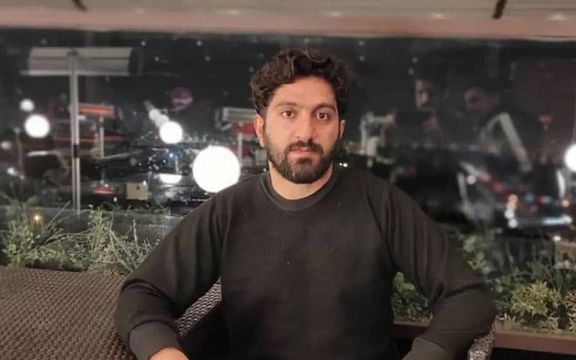
Political figures and activists continue to fight the threat of execution facing Reza Rasaei, a detainee involved in last year's nationwide protests in Iran.
Reza Rasaei, who comes from the marginalized Kurdish and Yarsan minorities in Iran, was sentenced to death on October 7 on trumped-up charges of killing a Revolutionary Guards agent.
The victim was identified as Nader Beirami, head of the Intelligence of the Revolutionary Guards in Sanandaj by the Iranian state media. Rasaei vigorously denies any involvement.
Dadban, a group of pro-bono Iranian lawyers dedicated to the defense of political prisoners and activists, reported in October that Beirami was killed in a clash between security forces and protesters during the commemoration of the death of a prominent Yarsan figure.
Known also as Ahl-e Haqq, the Yarsan faith is one of the earliest Middle Eastern religious traditions. It has an estimated three million followers in Iran, primarily in the western Kurdish areas.
The Yarsan community has encountered numerous challenges, including difficulties in registering their children as Yarsan at birth, restrictions on building places of worship, and the constant fear of persecution.
The security authorities attributed Beirami's murder to Rasaei without providing any evidence, witnesses, or documents, as reported by human rights organizations such as Dadban and Hengaw.
Following Rasaei's trial in the second branch of the Kermanshah Province Criminal Court, Amnesty International issued a warning regarding his imminent execution.
The international human rights organization noted that during interrogations Rasaei was subjected to torture and other ill-treatment, including electric shocks and severe beatings to compel his forced “confessions”.
Australian parliamentarian Keith Wolahan, said in a tweet on Saturday that they have not “forgotten him or the cause he stands for”.
“I have seen Amnesty International alerts about imminent political executions by the Islamic Republic of Iran. Reza Rasaei is one of them,” he wrote on X.
Amidst the Israel-Hamas war, Iran has executed at least 229 people since October 7 alone, according to The Telegraph, including women and minors, as the government's execution spree continues unabated.
Iran's Special Rapporteur on Human Rights in December described the level of killings, torture, and brutality committed against minorities as “shocking.”
Javaid Rehman revealed at an event in London on December 9 that more than half of the people who were killed throughout the "Woman, Life, Freedom" protests were from Baluch and Kurdish provinces.
The Iranian government executes more people each year than any other nation except China, according to Amnesty International.
According to a report in November by Norway-based Iran Human Rights, 604 people have been executed in the first ten months of the year, the highest number in eight years, including mass executions.
In 2022, the rights group recorded 582 executions, with the highest recent records being 972 in 2015.
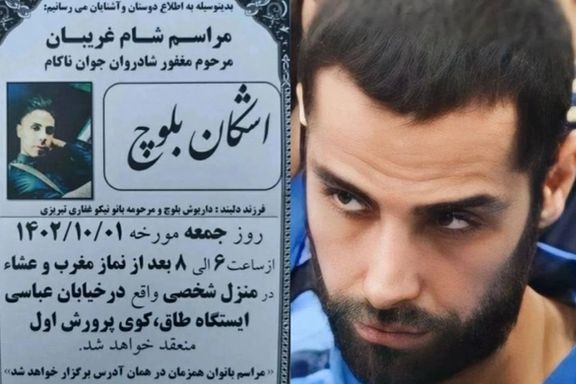
Ashkan Balouch (Baluch), a kickboxing athlete detained during Iran’s 2022 protests, has reportedly died under mysterious circumstances.
Milad Abdi, a former political prisoner once confined with Balouch in Tehran's prison, has branded his death a “suicide.” However, judicial and forensic authorities have yet to comment.
According to Abdi, Balouch, had been granted amnesty after two suicide attempts. In October 2022, he was transferred to prison by security forces on his way home and, after a period of interrogations, was sentenced to five years in prison for charges of "collusion and conspiracy against national security."
However, it is believed Balouch had been summoned to the Ministry of Intelligence office a few days ago for further interrogation. Abdi has stated, "Ashkan repeatedly said he had no role in the protests."
The Islamic Republic has executed at least eight protesters in connection with the uprising sparked in September 2022 in response to the killing of Mahsa Amini in police custody.
According to human rights organizations, at least 551 protesters, including 68 children, were killed during the uprising. At least 22 individuals lost their lives under suspicious circumstances or due to suicide, and hundreds more suffered eye injuries. Thousands more were arbitrarily arrested.